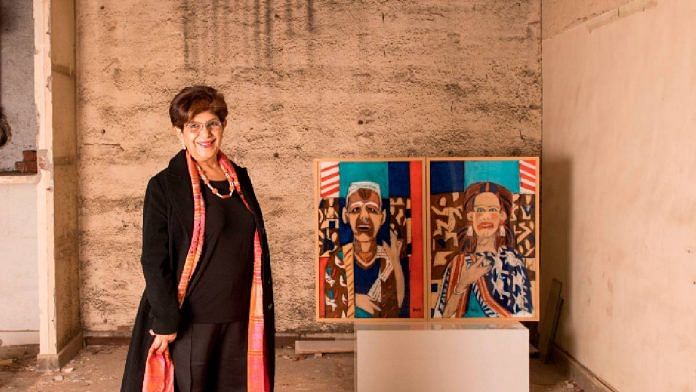New Delhi: Four performances shifted Amal Allana’s understanding of the power of theatre—Andha Yug, Tughlaq, Razia Sultan and Parallel Cities. They broke the barriers between actors and the audience. And Amal Allana should know. She is, after all, the former director of the National School of Drama, and the first three plays were staged as a trilogy by her late father, director and thespian Ebrahim Alkazi.
She mentioned how burqa-clad women from Old Delhi sat among the glitterati watching Alkazi’s plays, during the staging of Andha Yug, Tughlaq and Razia Sultan in 1973.
Tughlaq, written by Girish Karnad, was a satire on the Nehruvian era and the politics of the 1960s told through the story of Muhammad-bin-Tughlaq. Razia Sultan, written by Balwant Gargi, was also a political satire.
“The single-minded pursuit of power in Razia left no doubt that it was Indira Gandhi who was being referenced,” said Allana at India International Centre, during a discussion on ‘Art in Public Spaces’
No talk on public performance is complete without a reference to Safdar Hashmi’s political theatre group Janam which revolutionised street plays. “Janam’s 1989 production of Halla Bol in Jhandapur ended in a strange mix of fact and fiction as he was killed in the midst of the performance,” she added.
The last two plays she talked about are non-Indian productions, but with an inherent appeal to the country. The first was the 45-minute Polish anti-war production Carmen Funebre— , which uses stilts, fire and lights to create a physical experience that eliminates the need for dialogue. Staged in 1994, Allana calls it “one of the finest examples of physical theatre”.
The final production she references, Parallel Cities was conceived by Swiss dramatist Stefan Kaeg and Argentinian actor Lola Arias. Described as a ‘portable festival’, the experiential play transforms public spaces into stages, Allana was part of the production when it came to Delhi in 2013. She described how it began in a dimly-lit room in a multi-storied building at Barakhamba Road and ended on a dark terrace of a nearby building.
“It was as if we experienced Delhi once again, through our heightened senses,” she said.
Also Read: Iran-inspired hair box, iPad ‘books’—India Art Fair 2023 goes intimate and political
New avenues for public art
Kathak artiste Shovana Narayan and artist Paresh Maity, both of whom are Padma Shri awardees, were also part of the panel moderated by former diplomat Suresh Goel.
Where theatre can be inclusive, art is often accused of being exclusionary, limited to a small elite circle. Maity, alluding to this, brought up the recently concluded India Art Fair.
“I was surprised to note how expensive the tickets were,” he said.
In a sense, the very nature of a ‘fair’ or carnival allows for the mingling and interaction of people from all income groups. The art event, with tickets ranging from Rs 1,000 to Rs 7,000 is not accessible to many.
So, while theatre has managed to engage with the common man, through a variety of street and community festivals, paintings are still enshrined in the poshest locales across cities, including Delhi. But there have been attempts to bring down these barriers.
The city can be a canvas for art. Street art, be it on walls or bridges or building facades has brought art closer to citizens. Though Maity said he wished they were better planned.
In the meanwhile, there is another space that is emerging into a gallery. “It is airports which have now become repositories of public art. Look at Delhi’s international airport for instance or even Mumbai,” said Maity.
(Edited by Theres Sudeep)



